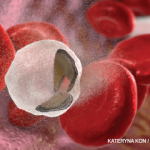Hematologists look for the patient’s underlying disorder or immune dysregulation when selecting treatment, said Dr. Gernsheimer. Even in lupus patients, other causes, such as hepatitis C or chronic lymphocytic leukemia (CLL), may cause the anemia. First-line therapy is corticosteroids at 1 to 1.5 mg/kg a day for one to three weeks to rapidly control the anemia. Patients should also take 1–2 g of folate daily, because of their rapid turnover of red blood cells. Transfusion is generally used only when the patient is very symptomatic, because allo-antibodies may not be easily detected, and a clean cross-match may not be possible.
For diagnosing primary immune thrombocytopenia (ITP), previously known as idiopathic thrombocytopenic purpura, definitive testing similar to the Coombs test is not available.8 This is a diagnosis of exclusion, said Dr. Gernsheimer. Diagnosis may be confirmed when the patient responds to appropriate therapy such as corticosteroids or IVIG. Testing should include quantitative immunoglobulin levels. Hematologists may also test for and treat H. pylori, as the infection could play a role in this condition, as well as test for antiphospholipid antibodies, hypothyroidism and viral infections. Rituximab may be used to treat ITP, but its efficacy tends to decline over time, and if duration of response is less than one year, it is usually not recommended for repeat therapy, she said.
Surgery Risks
Splenectomy has lower response rates in lupus patients with thrombocytopenia than the primary disorder, said Dr. Gernsheimer. “If these patients do fail, and then we have to switch to other immunosuppressant agents, this could be a problem, because you have a patient who is already relatively immunosuppressed due to their splenectomy.”
In ITP, in addition to accelerated platelet destruction, platelet production by megakaryocytes is suppressed, probably by antiplatelet autoantibodies. There may also be direct T cell targeting.9 Therapies include romiplostim or eltrombopag; both drugs bind to the thrombopoietin receptor on the megakaryocyte and increase platelet production. Some patients with chronic ITP may need indefinite therapy with these drugs; their side effects are fairly mild. Many patients can discontinue treatment after remission, she said.
Recent research has shown that ITP patients’ cellular and cytokine profiles are “consistent with an inflammatory state and decreased autoimmune regulatory function. Patients in remission have a shift in this balance,” said Dr. Gernsheimer. “It’s possible that monitoring cytokines and cellular mRNA levels could inform us about whether there may be a response to a therapy or a relapse, and lead us to new therapeutic opportunities.”


